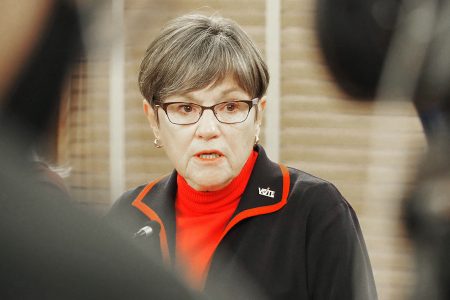Gov. Kelly: Kansas’ last-place COVID-19 inoculation rate misleading due to reporting lag

photo by: Sherman Smith/Kansas Reflector
Gov. Laura Kelly said Kansas' last-in-nation COVID-19 vaccination rate, based on CDC reporting, is misleading due to a lag in health workers documenting inoculations across the state. The CDC says Kansas trails the four surrounding states.
TOPEKA — The U.S. Centers for Disease Control and Prevention reported Tuesday that Kansas continued to trail four surrounding states in its COVID-19 vaccination rate, while Republican politicians denounced plans by Democratic Gov. Laura Kelly to place prison inmates ahead of the general public on the priority list for the shot.
Kelly said statistics reported by the CDC on Kansas’ vaccination rate were misleading because gaps in comparison with Missouri, Nebraska, Colorado and Oklahoma had been distorted by delays in documenting inoculations in Kansas. CDC data shows 20,158 people in Kansas received at least one shot for a rate of 692 per 100,000 residents. That ranked Kansas last nationally, according to the CDC. Mississippi had the second-worst inoculation rate of 745 per 100,000 residents.
Nebraska has distributed the vaccine to 36,753 people, according to the CDC, for a rate of 1,900 per 100,000. Here are the total vaccinations and per-capita rates for the three other states: Colorado, 114,555 shots, 1,989 per 100,000; Missouri, 98,589 shots, 1,606 per 100,000; and Oklahoma, 63,090 shots, 1,594 per 100,000.
“We’ve got people who right now are focused on getting vaccinations in people’s arms,” said Kelly, a Topeka Democrat. “Their sidelight is trying to get that data into the system. I think what we’ve done is just not pull them away from people to train them. We’re working on the reporting and getting the data into systems so that those numbers will change.”
When asked to explain the reporting shortfall in Kansas, Kelly said the state needed to prioritize prompt distribution of its allocation of 130,000 doses of vaccine while also upgrading contributions to the CDC and other public reporting on vaccination rates. The state has transferred coronavirus vaccines into all 105 counties, and the governor said Kansas had among the most efficient systems for moving vaccines from central storage hubs to health facilities in each county.
The CDC says 4.8 million doses of vaccine have been administered nationwide from among 17 million doses delivered to states and territories.
Ashley Jones-Wisner, spokeswoman for the Kansas Department of Health and Environment, said not all health providers were fully trained on computer systems used to report inoculations for COVID-19. The state-by-state vaccination numbers shared by CDC “are not current” in terms of Kansas, she said.
“We hope that as this process moves forward, and everyone becomes trained, we will be able to share accurate numbers more readily,” Jones-Wisner said.
Former Gov. Jeff Colyer, a surgeon and a Republican who served as governor for one year prior to Kelly’s election, said he was disappointed that CDC reports affirmed Kansas was the worst in the nation at COVID-19 vaccinations.
“It’s disheartening to see Kansas ranked at the bottom in immunizations,” Colyer said. “Last April, Kansas was ranked last in testing. Kansas should be a national leader — not last place.”
In October, the Kelly administration initiated a statewide coordinated testing strategy with a goal of conducting 1 million tests for COVID-19 by the end of December. On Tuesday, KDHE said the state conducted 1,001,000 coronavirus tests during 2020.
“Ramping up testing capabilities in Kansas has been critical to identify COVID-19 in our state and stop the spread,” said Dr. Lee Norman, secretary at KDHE. “Reaching this milestone in Kansas shows great success, but we must remain vigilant and continue following proven public health measures as we move into 2021. Free testing is available through the end of January, and I urge you to utilize testing locations in your area this month.”
Kansas Attorney General Derek Schmidt, a Republican who has been mentioned along with Colyer as a possible candidate for governor in 2022, didn’t object to the Kelly administration’s intent to offer the vaccine initially to front-line pandemic workers, including prison employees, as well as nursing home residents and employees.
The attorney general, however, said a distinct line should be drawn when it came to prison inmates.
“Kansas should save lives by putting older folks, wherever they live, ahead of younger inmates,” Schmidt said. “I think Kansas seniors, many of whom have been largely trapped in their homes since March, should have priority over prisoners. But, sadly, not everybody agrees.”
Schmidt said 85% of the COVID-19 fatalities in Kansas were among people age 65 and older. The Kansas Department of Corrections reports 13 inmates have died after testing positive for the coronavirus, which computes to a rate of less than 1% of the inmate population.
The state’s prison system houses about 8,600 inmates, and these facilities have reported more than 5,200 cases among incarcerated men and women. There have been nearly 1,000 infections among prison staff. Four corrections employees have died.
On Monday, the state corrections department said the first inmate at El Dorado Correctional Facility had died after testing positive for COVID-19. The man’s name wasn’t released, but he was 65 years old, tested positive Dec. 28 and was hospitalized Saturday. He had been incarcerated since 2010 on a 294-month sentence for attempted first-degree murder.







